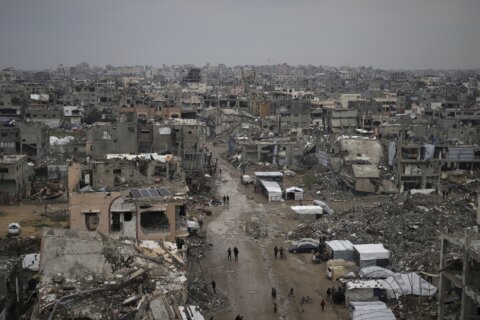STINNETT, Texas (AP) — Wildfires may have destroyed as many as 500 structures in the Texas Panhandle, Republican Gov. Greg Abbott said Friday, describing how the largest blaze in state history scorched everything in its path, leaving ashes in its wake.
Texas officials warned that the threat was not yet over. Higher temperatures and stronger winds forecast for Saturday elevated worries that fires in the Panhandle could spread beyond the more than 1,700 square miles (4,400 square kilometers) already chewed up this week by fast-moving flames.
The largest blaze, the Smokehouse Creek fire, which began Monday, has killed at least two people, and left a charred landscape of scorched prairie, dead cattle and burned-out homes. The cause of the fire remains under investigation, although strong winds, dry grass and unseasonably warm weather fed the flames.
“When you look at the damages that have occurred here it’s just gone, completely gone nothing left but ashes on the ground,” Abbott said during a news conference in Borger, Texas. He said a preliminary assessment found 400 to 500 structures had been destroyed.
Abbott praised what he called a “heroic” response from “fearless” firefighters.
“It would have been far worse and far more damaging not just to property but to people, but for those firefighters,” he said.
The National Weather Service forecast for the coming days warns of strong winds, relatively low humidity and dry conditions that pose a “significant” wildfire threat.
“Everybody needs to understand that we face enormous potential fire dangers as we head into this weekend,” Abbott said. “No one can let down their guard. Everyone must remain very vigilant.”
In the hard-hit town of Stinnett, population roughly 1,600, families who evacuated due to the Smokehouse Creek fire returned Thursday to devastating scenes: melted street signs and charred frames of cars and trucks. Homes reduced to piles of ash and rubble. An American flag propped up outside a destroyed house.
“We had to watch from a few miles away as our neighborhood burned,” Danny Phillips said, his voice trembling with emotion.
Phillips’ one-story home was still standing, but several of his neighbors weren’t so fortunate.
The Smokehouse Creek fire has also crossed into Oklahoma, and the Texas A&M Forest Service said Friday that it has merged with another fire. It was 15% contained Friday afternoon, up from 3% on Thursday.
Texas Agriculture Commissioner Sid Miller said individual ranchers could suffer devastating losses due to the fires, but predicted the overall impact on the Texas cattle industry and consumer beef prices would be minimal.
Two women were confirmed killed by the fires this week. But with flames still menacing a wide area, authorities haven’t yet thoroughly searched for victims or tallied homes and other structures damaged or destroyed.
Cindy Owen was driving in Texas’ Hemphill County south of Canadian on Tuesday afternoon when she encountered fire or smoke, said Sgt. Chris Ray of the state’s Department of Public Safety. She got out of her truck, and flames overtook her.
A passerby found Owen and called first responders, who took her to a burn unit in Oklahoma. She died Thursday morning, Ray said.
The other victim, an 83-year-old woman, was identified by family members as Joyce Blankenship, a former substitute teacher. Her grandson, Lee Quesada, said deputies told his uncle Wednesday that they had found Blankenship’s remains in her burned home.
President Joe Biden, who was in Texas on Thursday to visit the U.S.-Mexico border, said he directed federal officials to do “everything possible” to assist fire-affected communities, including sending firefighters and equipment. The Federal Emergency Management Agency has guaranteed Texas and Oklahoma will be reimbursed for their emergency costs, the president said.
“When disasters strike, there’s no red states or blue states where I come from,” Biden said. “Just communities and families looking for help.”
Abbott has issued a disaster declaration for 60 counties.
The weekend forecast and “sheer size and scope” of the blaze are the biggest challenges for firefighters, said Nim Kidd, chief of the Texas Division of Emergency Management.
“I don’t want the community there to feel a false sense of security that all these fires will not grow anymore,” Kidd said. “This is still a very dynamic situation.”
Jeremiah Kaslon, a Stinnett resident who saw neighbors’ homes destroyed by flames that stopped just on the edge of his property, seemed prepared for what the changing forecast might bring.
“Around here, the weather, we get all four seasons in a week,” Kaslon said. “It can be hot, hot and windy, and it will be snowing the next day. It’s just that time of year.”
Encroaching flames caused the main facility that disassembles America’s nuclear arsenal to pause operations Tuesday night, but it was open for normal work by Wednesday. The small town of Fritch, which lost hundreds of homes in a 2014 fire, saw 40 to 50 more destroyed this week, Mayor Tom Ray said.
___
Vertuno reported from Austin, Texas. Associated Press journalists Ty O’Neil in Stinnett, Texas, Jamie Stengle in Dallas, and Ken Miller in Oklahoma City contributed.
___
This story has been updated to correct the spelling of Jeremiah Kaslon’s last name from “Kalson” in one reference.
Copyright © 2025 The Associated Press. All rights reserved. This material may not be published, broadcast, written or redistributed.









